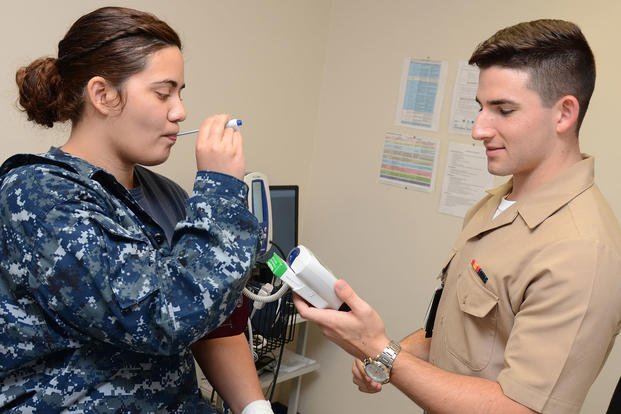Women can live longer, better lives, according to a preventive cardiologist who spoke at the Army Physical Fitness Research Institute's Women's Health Day, in Bliss Hall, Nov. 4. A healthy long life requires no special money or exercise equipment or expensive diet.
Dr. Richard J. Flanigan was introduced by Debra Williams, the U.S. Army War College senior spouse, with her own prescription for fellow spouses.
"We take care of others before we take care of ourselves. We'll even put the neighbors first," Williams said. "The word's not even in our vocabularies, but we have to be selfish in order to be selfless."
It's not rocket science, apparently, but it is backed up by medical evidence that 10 lifestyle decisions will add enjoyable years. Nutrition and exercise aren't just good ideas; they're a targeted assault on the diseases that kill.
Flanigan laid out the hard facts -- the 10 diseases that shorten lives -- and linked each killer to proven nutrition and exercise choices to fend off a shortened, unhealthy future.
1 & 2: Heart disease and stroke are 10 times more likely than breast cancer for women. More women will die of heart disease than men. We know that heart disease doesn't happen with a cholesterol level of 150 or less, and we can reverse plaque buildup in arteries by lowering blood pressure through statins.
3: Lung cancer is women's biggest cancer killer. Every cigarette costs seven minutes of life. Flanigan's prescription? No smoking, no secondhand smoke, no smokeless tobacco.
4: Overall, 80%-90% of cancers are due to external factors. Everything we put in our mouths can be good for us, but processed foods, saturated fats, white grains and high-fat dairy are not. One or more servings of fish per week, on the other hand, offer a 60% decrease in the incidence of Alzheimer's. He recommended "superfoods" like berries, the highest antioxidant food. He recommended fruit, vegetables, alcohol, nuts, olive oil, fatty fish, legumes, onions/garlic, whole grains and sunshine/vitamin D.
5: The body deteriorates 6% every decade until 70, when the rate picks up to 20%. But you can affect what kind of condition you're in at 70. The true fountain of youth is exercise. Walk three miles a day or 20 miles a week. Jogging slows down the effect of aging. Running is the most efficient exercise you can do, he said, while admitting his admiration of golf as a wonderful form of exercise.
6: Weight is the biggest contributor to diabetes, he said, prescribing exercise and good nutrition.
7: Accidents come in as the number seven killer. Only 47% of high school students wear seat belts.
8: Alzheimer's seems to be a vascular disease, and the same factors can affect it, Flanigan said. Control dementia by eating fruits and vegetables and treating blood pressure. After 55, men should take two baby aspirins and women one.
9: Half a drink a day is the most beneficial plan for wine.
10: There's a link between sunshine deficiency and cardiovascular disease. Everyone north of Atlanta is Vitamin D deficient in the winter months, he said. Take 1,000 milligrams of Vitamin D daily and a multivitamin.
Flanigan was followed by nutritionist Leslie J. Bonci, who guides the food choices of football players and other athletes at the University of Pittsburgh Medical Center. An expert nutritionist and a realist, Bonci makes lifestyle changes seem possible.
Bonci urged the women in the audience to focus on what's in it for them.
"Choose something encouraging you can do every day to improve your well-being profile," she said.
"Do one thing good for your body daily that's physically or mentally stimulating. Sleep 6-9 hours. Use positive messages to yourself and others: I can and will do this," she said, role-modeling a mental exercise to make a change. "Develop a good body image; if you spend time thinking about what your body is not or how much you should lose, it's negative.
"Make your eating environment conducive to success. Sit down so you are paying attention and will recognize when you have had enough. Eat when you're hungry. Eat soup. And recognize you need to move. If you move five minutes every hour for 18 hours daily, you get 90 minutes of movement. Physical exercise is good for all your body's systems."
The APFRI symposium received support from the Army War College Foundation, Carlisle Barracks Spouses Club and Carlisle Barracks Thrift Shop.
Want to Learn More About Military Life?
Whether you're thinking of joining the military, looking for fitness and basic training tips, or keeping up with military life and benefits, Military.com has you covered. Subscribe to Military.com to have military news, updates and resources delivered directly to your inbox.


















